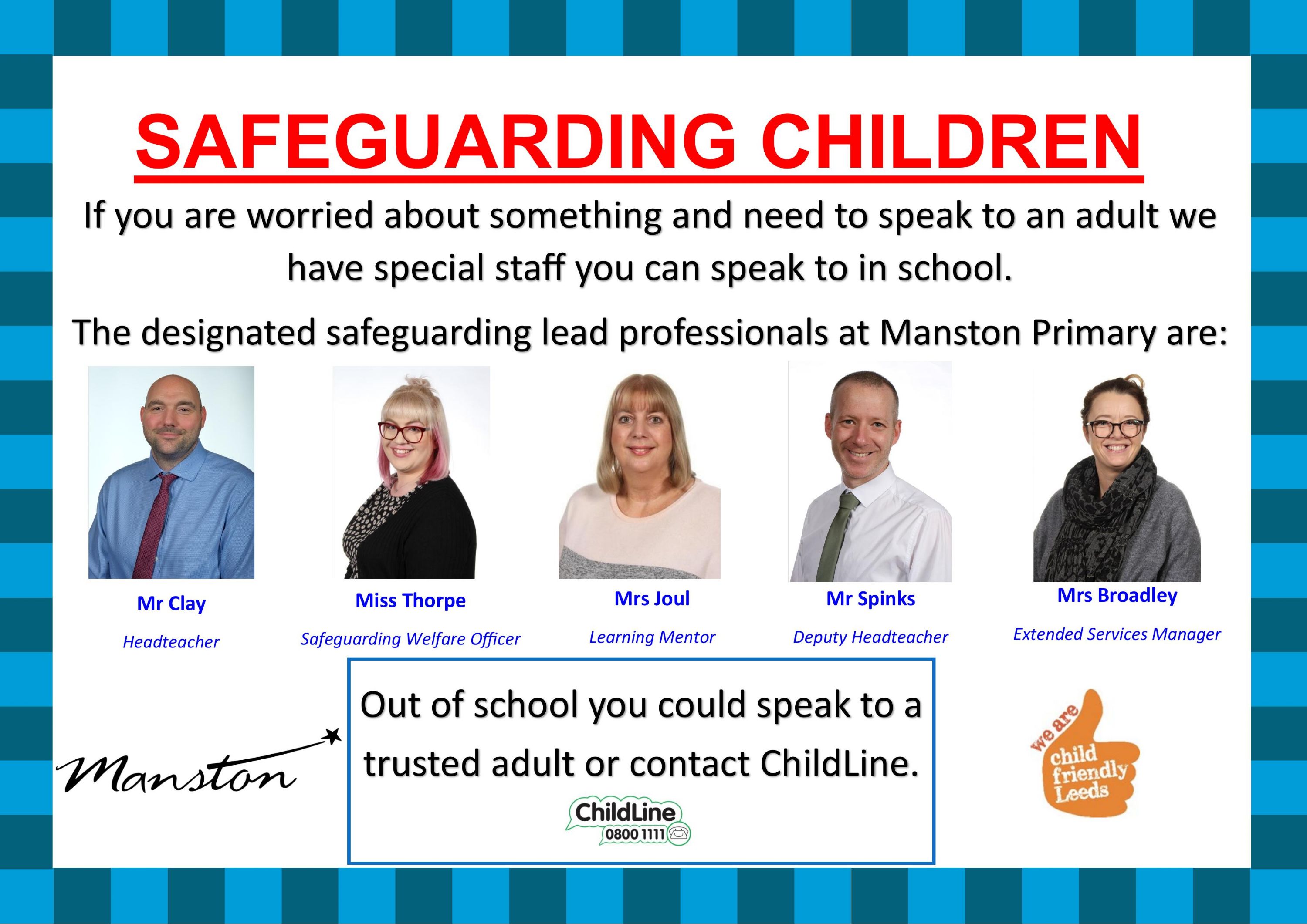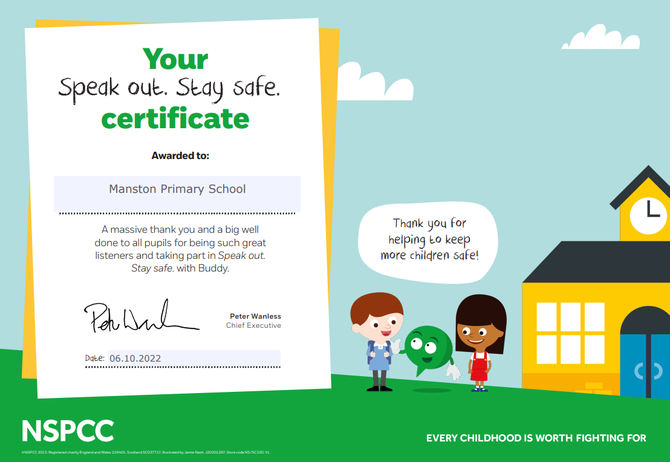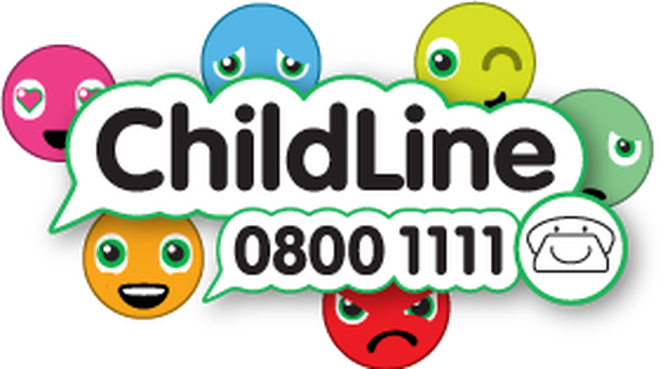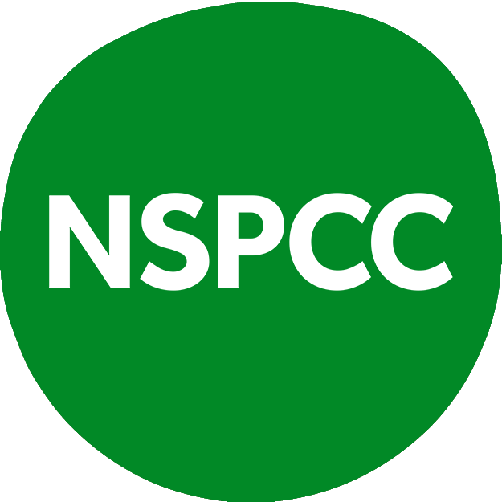Safeguarding Information
Safeguarding at Manston Primary School
At Manston Primary, keeping children safe is our top priority. We are fully committed to providing a secure, nurturing environment where every child feels safe, supported, and ready to learn.
We follow the latest Keeping Children Safe in Education guidance and work closely with families and external agencies to promote the welfare and wellbeing of all pupils.
“Pupils are looked after by caring staff who know them and their families well.”
– Ofsted, October 2022
Read our Safeguarding policy here:
Safeguarding and Welfare

How We Keep Children Safe
Our approach to safeguarding includes:
- A strong culture of vigilance across all staff
- Clear systems for reporting and recording concerns
- Safe recruitment of staff and regular training
- A curriculum that teaches pupils how to stay safe (including online)
- Support for children’s emotional wellbeing and mental health
- Effective working relationships with social care and other agencies
External Support and Guidance
If you're looking for more advice about keeping children safe or need help as a parent or carer, the Leeds Safeguarding Children Partnership (LSCP) provides information, support and resources for families:
🔗 Leeds Safeguarding Children Partnership – Support for Families
This site includes guidance on:
- What to do if you're worried about a child
- Help with parenting challenges
- Online safety
- Emotional well-being and more
Below are links to further sites for support and information.
What To Do If You’re Worried
If you're worried about a child, please don’t hesitate to speak to a member of the safeguarding team. Any concerns shared will be taken seriously and handled with sensitivity, care and discretion.
You can also contact Children’s Social Work Services directly:
📞 Leeds Duty & Advice Team: 0113 376 0336
The school governor who is responsible for safeguarding is Darren Scotland.

Safeguarding at Manston Primary is summarised as:
- protecting all children and learners from harm, neglect or maltreatment,
- preventing impairment of children’s and learners’ health and/or development,
- ensuring that children and learners are growing up in circumstances consistent with the provision of safe and effective care,
- ensuring that appropriate actions are taken, in a timely manner, to safeuard and promote children's welfare, all throughout childhood and adolescence,
- all staff are aware of their statutory responsibilities with respect to safeguarding, and
- all staff are properly trained in recognising and reporting safeguarding issues in order for our children to be happy and safe.
Safeguarding is an essential part of our school life, and it is our duty to ensure that our children are safe in and out of school, as well as online. Safeguarding involves every member of the school community in some way, and is our responsibility to make sure that we have a sharp eye on the particular circumstances and needs of all pupils, especially those who are the most vulnerable.
Leadership and management make safeguarding a main priority across all aspects of school by implementing:
- Strong training procedures for all staff and other adults, through our Safer Recruitment and Whistleblowing Policies. We also hold a Single Central Record listing of every adult who comes into contact with children in our school which makes sure that we have done the relevant safety checks to ensure everyone is safe to work with children. This is checked by the responsible Governor.
- Various policies and procedures in place for: Attendance, Behaviour, Anti-bullying, Safeguarding and Child Protection, Intimate Care, Health and Safety and especially Online Safety.
- Safeguarding and child protection arrangements are accessible by everyone, so that our families, as well as our adults in school, know who they can talk to if they are worried.
We learn about safeguarding in school by:
- a curriculum that is flexible, relevant and engages pupils’ interest,
- that is used to promote safeguarding by teaching pupils how to stay safe, how to protect themselves from harm and how to take responsibility for their own and others’ safety,
- having staff that have strong working relationships with extended services, such as the fire brigade, Police and other Early Help organisations, which help us to be safeguarded outside of school and in our local community.
NSPCC’s Speak out. Stay safe. online programme
This year, our pupils took part in the NSPCC'S Speak Out, Stay Safe online programme. This consisted of an online assembly and supporting classroom-based activities.
Speak out, Stay safe is a safeguarding programme available to all primary schools in the UK and Channel Islands. It aims to help children understand abuse in all its forms and to recognise the signs of abuse in a child-friendly way. Children are taught to speak out if they are worried, either to a trusted adult or Childline.
If you would like to know more about the Speak out Stay safe programme you can find information on the NSPCC website www.nspcc.org.uk/speakout.

Our staff safeguard us effectively in school by:
- ensuring that a high priority is given to staff training in the field of child protection and safeguarding, and that weekly staff meetings or briefings have a standard agenda item for Safeguarding.
- Robust safeguarding arrangements for site security, which all staff is aware of, understand and are then implented by staff and pupils. These are then reviewed and monitored by designated safeguarding leads, leadership and management to make sure that all children, staff and visitors are safe at all times.
- Strong communication systems are established with up-to-date information that can be accessed and shared by those who need it, including a safe and secure record-keeping system (CPOMS).

The Department for Education has commissioned the NSPCC to establish a dedicated independent helpline for people who have experienced sexual abuse in an educational setting.
The helpline went live on 1 April, and will provide both children and adults who have experienced sexual abuse in schools with support and advice, including onward action such as contacting the police if they wish to. The helpline will also provide support to parents and professionals. Anyone who gets in touch through this dedicated helpline will also be signposted to other relevant support services available, including Childline, which provides ongoing support and counselling to children and young people.
The dedicated and confidential NSPCC helpline – Report Abuse in Education can be reached on 0800 136 663 or by email at help@nspcc.org.uk.
Reporting Safeguarding Concerns
If you are a member of the public and wish to make a referral, you can call Children’s Social Work Services on 0113 222 4403, Monday to Friday 9am to 5pm, except Wednesdays when they are open from 10am. If you think a child is in immediate danger, please dial 999 and ask the police.
If you have any concerns about safeguarding at Manston Primary, contact the Local Authority Designated Officer on 0113 2478652.
If you are involved with a child or family in a professional capacity you can call the Duty & Advice team on 0113 376 0336, Monday to Friday, 8am to 6pm.
You can also discuss your concerns with someone who works with children and families, such as your health visitor, social worker, school nurse or teacher (all schools have a teacher responsible for child protection).
If the issue can’t wait until the next working day, please contact the Children’s Emergency Duty Team on 0113 376 0469 and provide them with as much information as possible. You can also email the Emergency Duty Team: childrensedt@leeds.gov.uk.
Privacy Notice (Pupil and Carer Data)
Privacy Notice (How we use pupil information)
Data Protection Legislation
In accordance with UK data protection law, individuals have the right to know what personal data we hold about them, and for what purpose.
This Privacy Notice explains how we collect, use, store and share personal data about pupils and their parents/carers. In data protection law, these activities are called data processing.
The categories of personal data we may process include:
- Personal information (such as name, unique pupil number and address, identification documents)
- Parental/carer contact information (name, telephone number, home address and email address)
- Characteristics (such as ethnicity, language, nationality, country of birth and free school meal eligibility)
- Attendance information (such as sessions attended, number of absences and absence reasons)
- Assessment information and results of internal and externally set tests
- Relevant medical information
- Special Educational Needs information
- Exclusions / behavioural information
Certain information is deemed to be “special category” which is more sensitive personal data. This includes, but is not retricted to,
- information about any medical conditions, including physical and mental health;
- photographs and CCTV footage captured in school
Why we collect and use this information
We use the pupil and parent/carer data listed above:
- To support pupil learning
- To keep children safe
- To monitor and report on pupil progress
- To provide appropriate pastoral care
- To assess the quality of our services
- To comply with the law regarding data sharing
- To assist with our administration and communication systems – for example, text messaging and cashless services in school.
The lawful basis on which we hold this information
We collect and use pupil and parent/carer information in accordance with the Information Commissioners’ Office (ICO) guidance on the lawful basis for processing as indicated below:
- Processing is necessary for compliance with a legal obligation. For instance, in order to comply with the legislation such as:
- Education Act 1996 and 2002;
- The Education (Pupil Information) (England) Regulations 2005;
- Keeping Children Safe in Education regulations (updated annually).
- Processing is necessary for the performance of a task carried out in the public interest or in the exercise of official authority vested in the controller.
- Explicit consent has been given
Collecting pupil information
Whilst the majority of pupil information you provide to us is mandatory, some of it is provided to us on a voluntary basis. In order to comply with the data protection legislation, we will inform you whether you are required to provide certain personal information to us or if you have a choice in this. For safeguarding purposes, we will need to collect contact information from parents and have a legitimate interest to share this information, on occasion, with all parties who have designated parental responsibility to verify its accuracy.
Storing pupil data
We hold pupil data in line with the Information Records Management Society Toolkit for Schools (see www.IRMS.org.uk / toolkit for schools)
Who we share pupil information with
We routinely share pupil information with:
- Schools or colleges that pupils attend after leaving us
- Local authorities
- The Department for Education (DfE) and other government departments
- Health services (NHS/Public Health England)
- Police forces, courts, tribunals
- Educational IT system providers such as ScholarPack, CPOMs, assessment tracking, Tapestry, Class Dojo, Timestables Rockstars, Wonde
Why we share pupil information
We do not share information about our pupils with anyone without consent unless the law and our policies allow us to do so.
We share pupils’ data with the Department for Education (DfE) on a statutory basis. This data sharing underpins school funding and educational attainment policy and monitoring.
We are required to share information about our pupils with our local authority (LA) and the Department for Education (DfE) under section 3 of The Education (Information about Individual Pupils) (England) Regulations 2013.
Data collection requirements:
To find out more about the data collection requirements placed on us by the Department for Education (for example; via the school census) go to:
https://www.gov.uk/education/data-collection-and-censuses-for-schools.
The National Pupil Database (NPD)
The NPD is owned and managed by the Department for Education and contains information about pupils in schools in England. It provides invaluable evidence on educational performance to inform independent research, as well as studies commissioned by the Department. It is held in electronic format for statistical purposes. This information is securely collected from a range of sources including schools, local authorities and awarding bodies.
We are required by law, to provide information about our pupils to the DfE as part of statutory data collections such as the school census and early years’ census. Some of this information is then stored in the NPD. The law that allows this is the Education (Information About Individual Pupils) (England) Regulations 2013.
To find out more about the NPD, go to https://www.gov.uk/government/publications/national-pupil-database-user-guide-and-supporting-information.
The department may share information about our pupils from the NPD with third parties who promote the education or well-being of children in England by:
- Conducting research or analysis
- Producing statistics
- Providing information, advice or guidance
The Department has robust processes in place to ensure the confidentiality of our data is maintained and there are stringent controls in place regarding access and use of the data. Decisions on whether DfE releases data to third parties are subject to a strict approval process and based on a detailed assessment of:
- Who is requesting the data
- The purpose for which it is required
- The level and sensitivity of data requested: and
- The arrangements in place to store and handle the data
To be granted access to pupil information, organisations must comply with strict terms and conditions covering the confidentiality and handling of the data, security arrangements and retention and use of the data.
For more information about the department’s data sharing process, please visit:
https://www.gov.uk/data-protection-how-we-collect-and-share-research-data
For information about which organisations the department has provided pupil information, (and for which project), please visit the following website:
https://www.gov.uk/government/publications/national-pupil-database-requests-received
To contact DfE: https://www.gov.uk/contact-dfe
Requesting access to your personal data
Under data protection legislation, parents and pupils have the right to request access to information about them that we hold. To make a request for your personal information, or be given access to your child’s educational record, contact the Headteacher / Data Protection Officer.
Parents or those with parent responsibility have the right to access their child’s educational record. This right applies as long as the pupil is aged under 18.
You also have the right to:
- Object to processing of personal data that is likely to cause, or is causing, damage or distress
- Prevent processing for the purpose of direct marketing
- Object to decisions being taken by automated means
- In certain circumstances, have inaccurate personal data rectified, blocked, erased or destroyed; and
- Claim compensation for damages caused by a breach of the Data Protection regulations
Complaints
We take complaints about our processing of personal data very seriously. If you believe our processing of your personal data or that of your child is unfair, misleading or inappropriate or have any other concern about the way we are collecting or using your personal data, we request that you raise your concern with us in the first instance. Alternatively, you can contact the Information Commissioner’s Office at https://ico.org.uk/make-a-complaint/ telephone 0303 123 1113, or write to: ICO, Wycliffe House, Water Lane, Wilmslow, SK9 5AF
Contact us
If you would like to discuss anything in this privacy notice, please contact:
Richard Lewis-Ogden – Data Protection Officer
Email: dataprotection@carrmanor.org.uk
Safety
- Missing Children Letter from West Yorkshire Police.pdf
- Road safety KS1 Leaflet for parents.pdf
- Road safety KS2 leaflet for parents.pdf
- Domestic Violence Notification.docx
One minute guides
Children’s Services is a broad, varied and complex area of work, and it can be difficult to make sense of the support available and know who does what.
Leeds City Council have developed a library of ‘one-minute guides’ that aim to provide straight-forward information about the different work professionals and agencies do and who is involved. The guides are for everyone to use, and they’re regularly adding to them with new topics and information. Please find a sample of those below; more can be found by following this link.
- One Minute Guide - Child Sexual Exploitation
- One Minute Guide - Child Sexual Abuse in the Family Environment
- One Minute Guide - Domestic Violence
- One Minute Guide - Female Genital Mutilation
- One Minute Guide - Problematic + Harmful Sexual Behaviour
- One Minute Guide - Looked after Child
- One Minute Guide - Young Carers
- One Minute Guide - Children Missing Out on Education
- One Minute Guide - Children Missing Education
Parent Factsheets
- Helplines for Parents and Carers.pdf
- Child Screen Time Factsheet.pdf
- 10 Tips to Stay Safe Online - Parent Factsheet
- AI Risks - Parent Factsheet
- County Lines - Parent Factsheet
- Cyber Flashing - Parent Factsheet
- Fake News - Parent Factsheet
- Live Streaming Platforms - Parent Factsheet
- Loot Boxes Skins Betting - Parent Factsheet
- Minecraft - Parent Factsheet
- Online Toxic Masculinity - Parent Factsheet
- Roblox - Parent Factsheet
- Sextortion - Parent Factsheet
- Snapchat - Parent Factsheet
- Telegram - Parent Factsheet
- TikTok - Parent Factsheet
- WhatsApp - Parent Factsheet
- YouTube - Parent Factsheet
- YouTube Kids - Parent Factsheet
Road Safety
Crossing Church Lane
Please may we encourage parents to remind their child/children to use the Green Cross Code when crossing busy roads – even if they are with an adult. NB this includes Church Lane outside school. For your reference the latest 2018 version is: -
- Think! Find the safest place to cross.
- Stop! Stand on the pavement near the kerb.
- Use your eyes and ears.
- Wait until it is safe to cross.
- Look and listen. When it is safe, cross sensibly.
- Arrive alive. Keep looking and listening as you cross.
Railway Safety
With Crossgates railway station not far away from our school, we regularly speak to pupils about the dangers of railways and how to keep themselves safe. The video below has been shared by Network Rail to help inform our pupils.
Presentation delivered to Year 5 and 6 pupils y Leeds United Foundation
-
Network Rail Safety Video Railway Safety Video
Buildings safety letter from LCC
-
Parent Booking System Please click this link to book parents' consultations.




